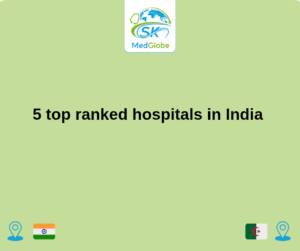India’s healthcare sector is rapidly gaining global recognition for its state-of-the-art facilities, highly skilled medical professionals, and affordable yet high-quality treatments. Whether it’s for a routine check-up, a specialized surgery, or groundbreaking medical procedures, the country’s leading hospitals stand at the forefront of modern medicine. What makes these hospitals truly remarkable is not just their advanced treatments, but also their global accreditations, which place them on par with the best hospitals worldwide. In this blog, we’ll take you inside India’s leading hospitals, exploring the advanced treatments they offer and the prestigious global accreditations that affirm their commitment to excellence.
1. The Evolution of India’s Healthcare Landscape
Over the last few decades, India has undergone a remarkable transformation in its healthcare infrastructure. From basic medical care to world-class facilities, Indian hospitals have evolved to meet international standards. Today, India is home to hospitals that are equipped with cutting-edge technology, offering an array of specialized treatments that rival those of the top medical institutions in the U.S., Europe, and other developed countries.
The driving forces behind this transformation are investments in infrastructure, government support for healthcare innovation, and the rising number of medical professionals who have trained at renowned institutions abroad. The combination of these factors has positioned India as a leader in medical tourism, attracting patients from all over the world seeking advanced medical care at a fraction of the cost they would pay in other countries.
2. Advanced Treatments Available in India’s Leading Hospitals
India’s top hospitals are renowned for their ability to offer the latest in medical advancements. From pioneering surgeries to innovative therapies, these hospitals provide world-class treatments in a range of specialties. Some of the most notable advanced treatments offered include:
a. Robotic Surgery: Precision and Minimally Invasive
Many leading hospitals in India are equipped with state-of-the-art robotic surgical systems, such as the da Vinci Surgical System. This technology allows surgeons to perform highly precise procedures with smaller incisions, which leads to faster recovery times and reduced risk of infection. Robotic surgery is particularly useful in fields like urology, cardiology, orthopedics, and gynecology.
Hospitals like Apollo proton, fortis, medenta are at the forefront of robotic surgery, offering patients advanced procedures with minimal scarring and quicker recovery.
b. Cancer Treatment: Cutting-Edge Oncology Care
India is home to some of the world’s leading cancer treatment centers. With the rise in the number of cancer patients globally, India’s hospitals have developed specialized oncology departments that use the latest technology for diagnosis, treatment, and rehabilitation. This includes state-of-the-art facilities for chemotherapy, radiation therapy, immunotherapy, and even proton therapy in some hospitals.
For example, the medenta hospital is renowned for its pioneering work in cancer care, offering the latest treatments for various types of cancer, including those that are rare and difficult to treat.
c. Stem Cell Therapy and Regenerative Medicine
Stem cell therapy has opened new avenues for treating a range of conditions, from spinal cord injuries to degenerative diseases like Parkinson’s. Indian hospitals are leading the way in the development and application of stem cell treatments, offering innovative therapies that are often unavailable in other countries.
Leading centers such as the max Research Center and the medanta are making significant strides in this field, providing patients with hope for conditions that were once considered untreatable.
d. Cardiac Care: State-of-the-Art Heart Surgeries
India’s leading hospitals excel in providing advanced cardiac care, offering specialized surgeries such as bypass surgery, valve replacement, and minimally invasive heart surgeries. The country is also home to expert cardiologists and surgeons who utilize the latest technologies to diagnose and treat heart conditions.
The medanta and rela are among the top cardiac care centers in the country, known for their exceptional outcomes and expertise in heart health.
e. Organ Transplantation: Cutting-Edge Procedures
India has become a hub for organ transplantation, including kidney, liver, and heart transplants. The country’s leading hospitals are equipped with the latest technologies in organ preservation, transplantation, and post-operative care, and they often perform these complex surgeries with impressive success rates.
Some of the best hospitals in India, such as the RELA Hospitals and MAX, have made significant advancements in organ transplantation, positioning themselves as leaders in this highly specialized field.
3. Global Accreditations: Ensuring World-Class Standards
What truly sets India’s leading hospitals apart is their commitment to maintaining the highest standards of care, as evidenced by their global accreditations. These accreditations not only enhance the reputation of Indian hospitals but also provide assurance to international patients that they are receiving the best possible treatment.
a. Joint Commission International (JCI) Accreditation
One of the most prestigious certifications a hospital can receive is the Joint Commission International (JCI) accreditation. This globally recognized accreditation is awarded to hospitals that meet strict international standards for patient safety, medical care quality, and healthcare facility management. Many of India’s leading hospitals, including Apollo Hospitals, Fortis Healthcare, and Narayana Health, have earned JCI accreditation, ensuring that they offer world-class healthcare services.
b. National Accreditation Board for Hospitals and Healthcare Providers (NABH)
In addition to international certifications, India’s top hospitals also receive accreditation from the National Accreditation Board for Hospitals and Healthcare Providers (NABH). NABH accreditation is a national standard that ensures hospitals meet rigorous criteria related to healthcare quality, patient safety, and operational efficiency. It is a testament to the hospitals’ adherence to national quality standards and their ongoing efforts to improve healthcare delivery.
c. ISO Certification
Many hospitals in India are also ISO-certified, further demonstrating their commitment to maintaining high standards in patient care, safety, and operational management. ISO certification is a global benchmark that assures patients that the hospital has implemented quality management systems in line with international best practices.
4. The Future of Healthcare in India
With its rapidly evolving healthcare infrastructure, India’s leading hospitals are poised to become even more significant players on the global healthcare stage. The country’s ability to combine cutting-edge technology, skilled medical professionals, and world-class treatments at an affordable cost makes it an attractive destination for patients worldwide.
As medical research continues to advance, we can expect Indian hospitals to remain at the forefront of global medical innovations, offering even more specialized treatments and therapies in the future. The continued emphasis on quality care and patient satisfaction ensures that India will continue to be a trusted destination for medical treatment for years to come.
Conclusion
India’s leading hospitals stand as exemplars of advanced medical treatments and world-class care. Their cutting-edge technologies, coupled with globally recognized accreditations, provide patients with the assurance that they are receiving the highest standards of care. Whether it’s for complex surgeries, cancer treatments, or organ transplants, India’s hospitals are more than equipped to meet the needs of patients from around the world. With world-class medical professionals, state-of-the-art facilities, and a commitment to excellence, India’s healthcare sector is truly a global leader.






 English
English  العربية
العربية  Français
Français